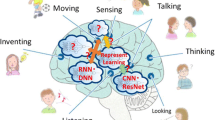Abstract
Abstract intelligence is the human enquiry of both natural and artificial intelligence at the neural, cognitive, functional, and logical levels reductively from the bottom up. According to the abstract intelligence theory, a cognitive robot is an autonomous robot that is capable of thought, perception, and learning based on the three-level computational intelligence known as the imperative, autonomic, and cognitive intelligence. This paper presents the theoretical foundations of cognitive robots based on the latest advances in abstract intelligence, cognitive informatics, and denotational mathematics. A formal model of intelligence known as the Generic Abstract Intelligence Mode (GAIM) is developed, which provides a foundation to explain the mechanisms of advanced natural intelligence such as thinking, learning, and inference. A set of denotational mathematics is introduced for rigorously modeling and manipulating the behaviors of cognitive robots. A case study on applications of a denotational mathematics, visual semantic algebra (VSA), is presented in architectural and behavioral modeling of cognitive robots based on the theory of abstract intelligence.
Similar content being viewed by others
References
J. Albus, Outline for a Theory of Intelligence, IEEE Transactions on Systems, Man and Cybernetics, 21, 1991, 473–509.
E. A. Bender, Mathematical Methods in Artificial Intelligence, IEEE CS Press, Los Alamitos, CA, 1996.
R. A. Brooks, New Approaches to Robotics, American Elsevier, 5, 1970, 3–23.
D. O. Ellis and J. L. Fred, Systems Philosophy, Prentice Hall, Englewood Cliffs, NY, 1962.
H. Gardner, Frames of Mind: The Theory of Multiple Intelligences, Basic Books, NY, 1983.
J. Giarrantans and G. Riley, Expert Systems: Principles and Programming, PWS-KENT Pub. Co., Boston, 1989.
C. Hewitt, Viewing Control Structures as Patterns of Passing Messages, Artificial Intelligence, 8, 1977, 323–364.
N. R. Jennings, On Agent-Based Software Engineering, Artificial Intelligence, 17, 2000, 277–296.
M. I. Jordan, Computational Intelligence, in R. A. Wilson and C. K. Frank Eds., The MIT Encyclopedia of the Cognitive Sciences, MIT Press, 1999.
S. C. Kleene, Representation of Events by Nerve Nets, in C. E. Shannon and J. McCarthy Eds., Automata Studies, Princeton Univ. Press, 1956, 3–42.
L. A. Lefton, L. Brannon, M. C. Boyes, and N. A. Ogden, Psychology, 2nd Ed., Pearson Education Canada Inc., Toronto, 2005.
M. W. Matlin, Cognition, 4th Ed., Harcourt Brace College Publishers, Orlando, FL, 1998.
J. McCarthy, M. L. Minsky, N. Rochester, and C. E. Shannon, Proposal for the 1956 Dartmouth Summer Research Project on Artificial Intelligence, Dartmouth College, Hanover, NH, USA, 1955.
W. S. McCulloch, Embodiments of Mind, MIT Press, Cambridge, MA, 1965.
A. M. Meystel and J. S. Albus, Intelligent Systems, Architecture, Design, and Control, John Wiley & Sons, Inc, 2002.
S. T. Parker and M. L. McKinney, Origins of the Intelligence, The Evaluation of Cognitive Development in Monkeys, Apes and Humans, The John Hopkins University Press, 1999.
D. G. Payne and M. J. Wenger, Cognitive Psychology, Houghton Mifflin Co., Boston, 1998.
R. J. Sternberg, The Concept of Intelligence and the its Role in Lifelong Learning and Success, American Psychologist, 52, 1997, 1030–1037.
R. J. Sternberg, Implicit Theory of Intelligence as Exemplar Stories of Success: Why Intelligence Test Validity is in the Eye of the Beholder, Journal of Psychology, Public Policy, and Law, 6, 2000, 159–167.
R. J. Sternberg, Cognitive Psychology, 3rd Ed., Thomson Wadsworth, 2003.
Y. Wang, The Real-Time Process Algebra (RTPA), Annals of Software Engineering: A International Journal, 14, 2002, 235–274.
Y. Wang, On Cognitive Informatics, Brain and Mind: A Transdisciplinary Journal of Neuroscience and Neurophilosophy, 4, 2003, 151–167.
Y. Wang, Software Engineering Foundations: A Software Science Perspective, CRC Series in Software Engineering, Vol. II, Auerbach Publications, New York, 2007.
Y. Wang, The Theoretical Framework of Cognitive Informatics, International Journal of Cognitive Informatics and Natural Intelligence, 1, 2007, 1–27.
Y. Wang, On Contemporary Denotational Mathematics for Computational Intelligence, Transactions of Computational Science, 2, 2008, 6–29.
Y. Wang, On Concept Algebra: A Denotational Mathematical Structure for Knowledge and Software Modeling, International Journal of Cognitive Informatics and Natural Intelligence, 2, 2008, 1–19.
Y. Wang, On abstract intelligence: toward a unified theory of natural, artificial, machinable, and computational intelligence, International Journal of Software Science and Computational Intelligence, 1, 2008, 1–17.
Y. Wang, On Visual Semantic Algebra (VSA): A Denotational Mathematical Structure for Modeling and Manipulating Visual Objects and Patterns, International Journal of Software Science and Computational Intelligence, 1, 2009, 1–16.
Y. Wang, S. Patel, and D. Patel, A Layered Reference Model of the Brain (LRMB), IEEE Trans. on Systems, Man, and Cybernetics (C), 36, 2006, 124–133.
Y. Wang, L. A. Zadeh, and Y. Yao, On the system algebra foundations for granular computing, International Journal of Software Science and Computational Intelligence, 1, 2009, 64–86.
B. Widrow and M. A. Lehr, 30 Years of Adaptive Neural Networks: Perception, Madeline, and Backpropagation, Proc. of the IEEE, 78, 1990, 1415–1442.
R. A. Wilson and F. C. Keil, The MIT Encyclopedia of the Cognitive Sciences, MIT Press, 2001.
Author information
Authors and Affiliations
Corresponding author
About this article
Cite this article
Wang, Y. Abstract intelligence and cognitive robots. Paladyn 1, 66–72 (2010). https://doi.org/10.2478/s13230-010-0007-z
Received:
Accepted:
Published:
Issue Date:
DOI: https://doi.org/10.2478/s13230-010-0007-z




